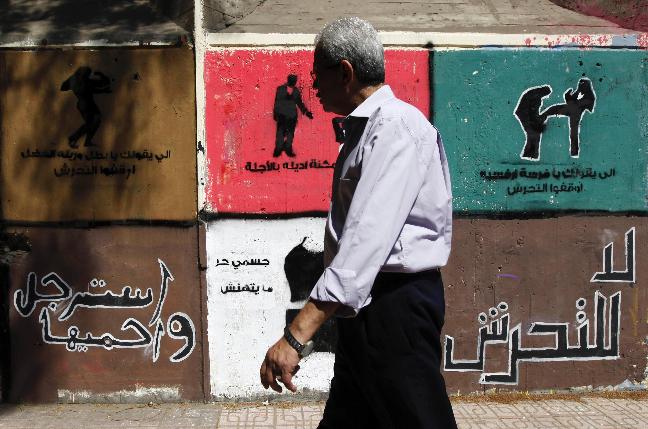
“I can no longer walk – or even drive – anywhere without receiving a dirty comment or without feeling scared that I may be attacked at any moment.” Those were the comments of one female university graduate on life as a woman in Egypt.
“It’s disgusting and makes me feel like I am walking around naked!” said another female who happens to be veiled. “The abuse impacts all women of Cairo. Whether you are wearing the hijab, the niqab, or whether you are not veiled…women are harassed no matter what!”
This is the sexual terrorism that women across Egypt go through each day. Statistics released reveal that more than 90% of Egypt’s women – regardless of the neighborhood they live in – have encountered sexual harassment: grand-mothers, mothers, daughters – no one is off limits.
While driving in the relatively ‘upscale’ Heliopolis, I noticed a bunch of youth who had stopped their car and started verbally abusing a woman – in her 20s – who simply turned her face away and hurried quickly to a nearby store.
The attitude towards women in society has deteriorated over the past few decades – with sexual harassment getting worse post-revolution. Over the past few weeks, sexual harassment has marred protests at both Tahrir Square an at the Presidential Palace – with reports of women being surrounded by groups of men who then proceed to rip off their clothes and brutally violate their bodies.
An anti-sexual harassment group, Op Anti-Sexual Harassment/Assault that was created to protect females from protest zones, shared the following testimonial of a female who was attacked on the 25th of January 2013:
All I remember is hands all over my body, grabbing under the layers of pullovers I was wearing, touching my breasts, opening my bra. More hands on my back and legs, my pants being pulled down. I was trying not to lose balance and not to lose my purse with my phone inside. My empty hand tried to pull my pants back up when I felt fingers inside my ass and shortly after in my vagina. I dropped my purse and pulled up my pants again, or I tried at least. Then more penetration with fingers from the front and the back. I tried to see the end of circle of men, but saw rows and rows of men surrounding me, all pushing towards me. I panicked, and was pushed aside. I remembered my purse, reached to the ground, picked it up and fell on the ground. With one hand I was hanging onto the purse; with the other I tried to pull myself up. Men’s hands were still on my body and somebody penetrated my vagina again with his hands. I had successfully got up. At that point I remember sounds again and I remember me beginning to shout for help. One man, a few meters away recognized the situation and moved towards me in the middle of maybe forty men, maybe more. He shouted and hit some of the men around me in order to reach me. When I could reach his hand, I simply handed him my purse and grabbed his arm. Then I just hugged the stranger and told him to help me. From behind, my pants were still be pulled down, hands everywhere.
Disgustingly, certain officials, radicals, and sexual predators have blamed women on such attacks. Today, the Interior Minister’s Undersecretary blamed women’s attire and lack of modesty. This is similar to what one man interviewed by the BBC stated: “It’s the way girls dress that makes guys come on to them. The girls came wanting it – even women in niqab.”
Yet, after many years of silence women are finally standing up for their rights – calling for equality and above all, justice.

During the Anti-Morsi protests in December 2012, more women than men converged outside the Presidential Palace to call for the rejection of a constitution that would lead to unequal rights for women. One woman, who held a sign stating “The voice of women IS the revolution” said that women are no longer afraid of expressing their frustrations with the lack of equality in society.
Today, global protests are set to take place outside Egyptian embassies, calling for an end to sexual harassment in Egypt. The protests – which are starting at the same time (5pm local time) as one in Cairo – aim to shed light on the abuse of Egyptian women and to pressure both the government and the international community to do more.
Egyptian women are risking their safety by marching on Egypt’s streets and demanding to be noticed. Despite the risks and potential of being attacked, one female protester told me “I will be protesting because I want to be treated like a human being. The goal of these harassers is to scare us – but we will not be silenced anymore.”
EgyptianStreets now has a Facebook page! Click here to like and support!






Comments (128)
It is absolutely disgraceful that women are being treated in this way in Egypt and even more so that it is being claimed that the women are bringing this on themselves, or asking for this abuse due to what they are wearing. It is hard to believe that 90% of women in Egypt have been subjected to such abuse. Having said that, post revolution it seems that women are finally feeling able to stand up for their rights and challenge sexual harassment. This is a positive sign and will be crucial in Egypt’s transition to a democracy.
It is definitely inspiring to see women finally standing up for their rights post-revolution. Perhaps the greatest achievement of the revolution was that Egyptians are no longer afraid to speak their mind – they want their voices to be heard!
It is so sad to hear about the treatment of women in some countries, but at the same time I am so happy to hear that women are standing up and willing to protest and fight against this unequal treatment of them. It’s unbelievable that in this day and age, some (not all, but some) men feel that they are superior to women and can do what they want to them. Worse yet, is to blame the woman when stuff like this happens.
Thank you for bringing awareness to what is going on in Egypt and what steps are being taken to change the way things function. Well-deserved FP! 🙂
It is indeed great that women across the globe are standing up for their rights and are fighting against the unequal treatment and abuse. However, I believe there is so much that they can do, and that the wider international community and the government itself, need to take more decisive action and respond to the cries of women in Egypt: education, law, religion – all need to be reformed in a way that calls for the respect of women.
Thank you for your feedback!